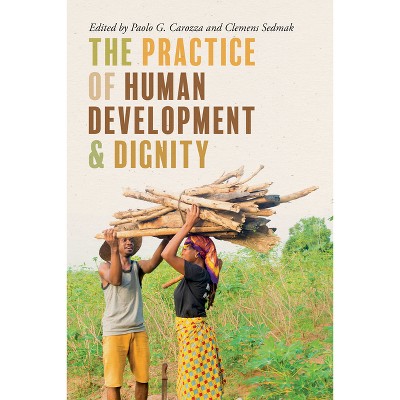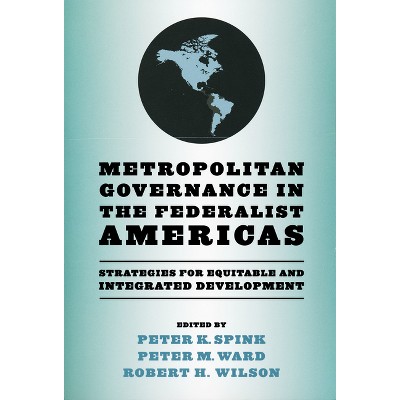The Politics of Past Evil - (From the Joan B. Kroc Institute for International Peace Stud) by Daniel Philpott (Paperback)

About this item
Highlights
- Over the past two or three decades, all over the world, a formidable number of societies have sought to confront past evil--the injustices of communism, military dictatorship, apartheid, or civil war.
- About the Author: Daniel Philpott is a professor in the department of political science and the Joan B. Kroc Institute for International Peace Studies, University of Notre Dame.
- 262 Pages
- Philosophy, Good & Evil
- Series Name: From the Joan B. Kroc Institute for International Peace Stud
Description
About the Book
"A great strength of this timely volume is its combination of a theological and philosophical accounting of reconciliation, with an empirically driven appreciation for how such reconciliation practices work out in the world of politics. Bringing together the insights of disparate disciplines on most any topic is always admirable, but more important in this case is that the topic under consideration in this book--reconciliation--demands such an interdisciplinary perspective. As such, it is likely to generate a good deal of interest in political science, history, sociology, philosophy, religious studies, and theology." --J. Christopher Soper, Pepperdine University "Sentimentality threatens and undermines the work of reconciliation. So thank God we have this book of extraordinary essays on reconciliation and forgiveness. These essays show at once the hard yet crucial work that is reconciliation. Moreover, it is not work that simply takes place between people, but as these essays show, it can be the heart of politics. Indeed, these essays demonstrate that reconciliation is a politic that we cannot live without. The philosophical, theological, and political sophistication of these essays will make this book the book of record on issues of reconciliation and forgiveness." --Stanley Hauerwas, Gilbert T. Rowe Professor of Theological Ethics, Duke Divinity School What place does reconciliation have in the politics of transitions? What are the warrants for it? In this important new volume, Alan J. Torrance, David B. Burrell, C.S.C., Nicholas Wolterstorff, and Daniel Philpott draw on theology for their theoretical perspectives in answering these questions; A. James McAdams, Mark R. Amstutz, and Ronald A. Wells chart the path of reconciliation in Germany, Argentina, South Africa, and Northern Ireland. R. Scott Appleby offers a concluding essay. Their insights will interest a wide variety of readers, both scholars and generalists, both with and without theological commitments.Book Synopsis
Over the past two or three decades, all over the world, a formidable number of societies have sought to confront past evil--the injustices of communism, military dictatorship, apartheid, or civil war. Emergent is the concept of reconciliation, whose meaning philosophers and social scientists now debate in the context of political transitions in countries as diverse as South Africa, East Timor, Guatemala, and the Czech Republic. Most of these debates, though, share a secularism that is at variance with the beliefs of many of the participants in these transitions.
What unfolds in this volume, in contrast, is a conversation about reconciliation whose common denominator is theology. Theologians, philosophers, and political scientists explore the meaning of reconciliation for the politics of transition. Alan Torrance, David Burrell, C.S.C., Nicholas Wolterstorff, and Daniel Philpott draw on theology for their theoretical perspectives; A. James McAdams, Mark Amstutz, and Ronald Wells chart the path of reconciliation in Germany, Argentina, South Africa, and Northern Ireland. Scott Appleby offers a concluding essay. Their insights will interest a wide variety of readers, both scholars and generalists, both with and without theological commitments.
Review Quotes
" 'Truth and reconciliation commissions' have been used in countries as various as South Africa, El Salvador, Chile, and Guatemala in order to deal, personally and politically, with great crimes and injustices. The thoughtful essays in this book effectively make the case that the choice is not, or not always, between justice and reconciliation. Rather, the authors argue from various perspectives, reconciliation is an essential ingredient of justice." --First Things
"Sentimentality threatens and undermines the work of reconciliation. So thank God we have this book of extraordinary essays on reconciliation and forgiveness. These essays show at once the hard yet crucial work that is reconciliation. Moreover, it is not work that simply takes place between people, but as these essays show, it can be the heart of politics. Indeed, these essays demonstrate that reconciliation is a politic that we cannot live without. The philosophical, theological, and political sophistication of these essays will make this book the book of record on issues of reconciliation and forgiveness." --Stanley Hauerwas, Gilbert T. Rowe Professor of Theological Ethics, Duke Divinity School
"The purpose of this book is to consider a number of political questions about reconciliation from a theological standpoint. . . . The contributions to this book are well thought-out and well edited, and successfully tie themes together across chapters. One common thread in several chapters is the idea that societies must consider and deal with the past to move on to a positive and successful future." --PsycCRITIQUES
"The Politics of Past Evil sheds light on an important question: How do newly established democratic governments - in countries that previously lived under Communism, military dictatorship, or apartheid - address the crimes and injustices committed by the previous regime?... The book as a whole is both innovative and provocative. It enriches the literature on democratization by introducing theological as well as political and philosophical reasoning into the transitional logic." -- Journal of Cold War Studies
"Philpott's collection offers excellent multidisciplinary approaches that are concretized in case studies. It is an ideal text for teaching, whether in politics or social ethics." --Theological Studies
"The essays . . . collected here offer a comprehensive, as well as an immensely timely and instructive, account of the role that Christian theological insights can play in generating genuine political reconciliation in divided societies." --Choice
"The volume takes up the pressing legal, political, and moral problems that face societies in their attempt to move from violent civil discord to civil stability, from brutally repressive regimes to functioning free societies. . . . The book brings together political scientists, theologians, and historians and gives each contributor ample latitude to pursue the questions that emerge in transitioning nations-whether a state can extend forgiveness, how to treat perpetrators of past injustice, how to help victims heal, how to minimize violent recriminations and maximize chances for a just and stable future society." --Journal of Church and State
About the Author
Daniel Philpott is a professor in the department of political science and the Joan B. Kroc Institute for International Peace Studies, University of Notre Dame. He is the author of Revolutions in Sovereignty: How Ideas Shaped Modern International Relations.
Shipping details
Return details
Trending Poetry











